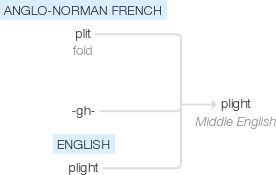Plight
Middle English: from Anglo-Norman French plit ‘fold’. The -gh- spelling is by association with plight2.
wiktionary
From Middle English plit(“fold, wrinkle, bad situation”), conflation of Middle English pliht, plight(“risky promise, peril”) (from Old English pliht "danger, risk") and Anglo-Norman plit, plyte(“fold, condition”), from Old French pleit(“condition, manner of folding”) (from Vulgar Latin *plictum, from Latin plicitum(“fold”)).
From Middle English plight(“risk, danger”), from Old English pliht(“peril, risk, danger, damage, plight”), from Proto-West Germanic *plihti(“care, responsibility, duty”). A suffixed form of the root represented by Old English pleoh(“risk, danger, hurt, peril"; also "responsibility”) and plēon(“to endanger, risk”). Akin to Old English plihtan(“to endanger, compromise”). Cognate with Scots plicht(“responsibility, plight”), Dutch plicht, Low German plicht(“duty”), German Pflicht(“duty”), Danish pligt(“duty”), Yiddish פֿליכט (flikht). More at pledge.
From Middle English plyghten, plyȝten, pleyȝten, pleiten, pliten, from the noun (see below).
From Middle English pliȝt, plight, plyt, pleit, from Anglo-Norman pleit(“pleat, fold”). More at plait.
etymonline
plight (v.)
"to pledge, engage by solemn promise" (obsolete except in archaic plight one's troth), Middle English plighten, from Old English pligtan, plihtan "to endanger, imperil, compromise," verb form of pliht (n.) "danger, risk" (see plight (n.2)), from Proto-Germanic *plehti-, which ultimately is perhaps from PIE root *dlegh- "to engage oneself, be or become fixed," or else a substratum word. The notion is "to put (something -- honor, troth) in danger or risk of forfeiture;" it is rarely used of physical things. Related: Plighted; plighting.
plight (n.1)
late Old English pliht, "danger, harm, trouble; strife," from Anglo-French plit, pleit, Old French pleit, ploit "condition" (13c.), originally "way of folding," from Vulgar Latin *plictum, from Latin plicitum, neuter past participle of Latin plicare "to fold, lay" (from PIE root *plek- "to plait"). A doublet of plait (n.).
Originally "condition or state," usually "a bad condition or state" but sometimes in a neutral sense (as in modern French en bon plit "in good condition"); the predominant sense of "harmful state" (and current spelling) probably is from convergence and confusion with plight (n.2) via a notion of "entangling risk, pledge or promise with great risk to the pledger."
plight (n.2)
mid-13c., "solemn pledge, promise," usually concerning a serious matter and involving risk or loss in default, from Old English pliht "danger, risk, peril, damage," from Proto-Germanic *pleg- (source also of Old Frisian plicht "danger, concern, care," Middle Dutch, Dutch plicht "obligation, duty," Old High German pfliht, German Pflicht "obligation, duty," which is perhaps from PIE root *dlegh- "to engage oneself, be or become fixed," or it might be a substratum word. Compare Old English plihtere "look-out man at the prow of a ship," plihtlic "perilous, dangerous."
